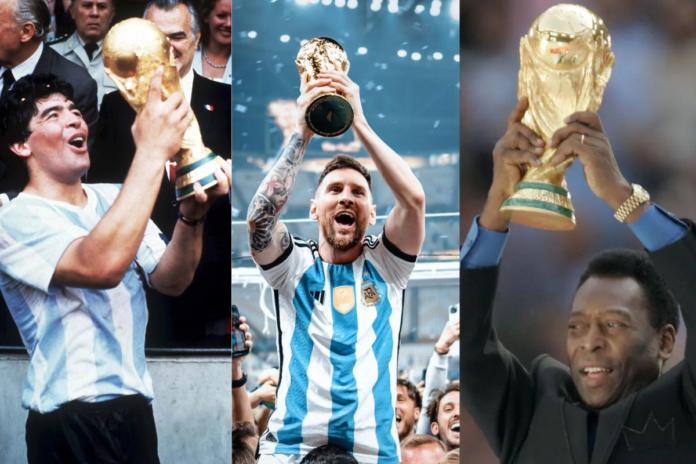Football has given us legends whose talent and passion have shaped the sport we love. From the magic of Diego Maradona and the incredible goals of Pelé to the modern genius of Lionel Messi and Cristiano Ronaldo, these players have defined eras and inspired millions. In this blog, we celebrate the best footballers of all time — the ones who broke records, won hearts, and helped make football the world’s most popular game. Let’s dive into their careers, iconic moments, and lasting legacies as we honor the players who truly represent the beauty of football.
Top 10 Best Footballers Of All Time
10. Michel Platini
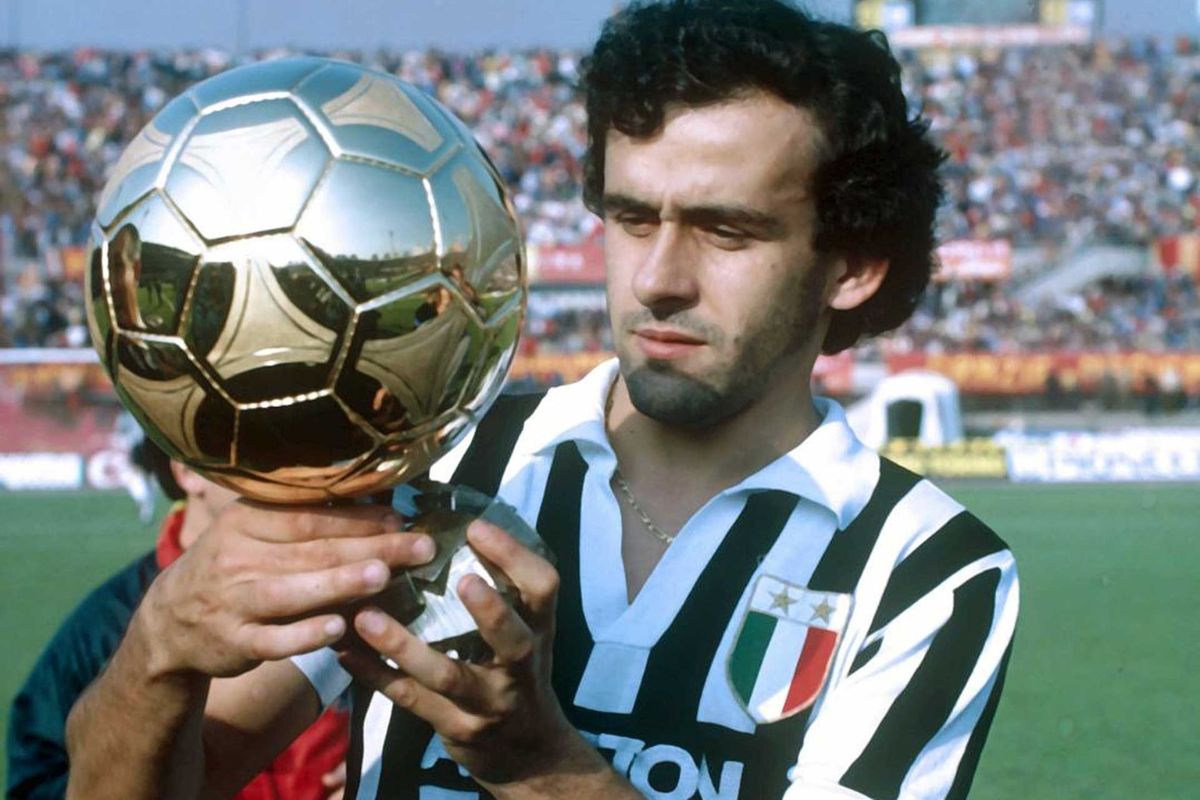
| Years |
Team |
Apps |
Goals |
| 1972–1979 |
Nancy |
181 |
98 |
| 1979–1982 |
Saint-Étienne |
104 |
58 |
| 1982–1987 |
Juventus |
147 |
68 |
In our 10th rank of our list of Best Football Players of All Time, Michel Platini, one of the most gifted and influential midfielders in football history, born in 1955 in Jœuf, France, has left a legacy of undeniable brilliance and impact.
Known for his creativity, vision, and precise passing, Platini made a significant impact in European football during the 1980s. His career began at Nancy, before he moved to AS Saint-Étienne, where his talent began to shine. However, it was at Juventus, where Platini truly established his legacy, leading the club to domestic and European glory.
He led France to victory in the 1984 UEFA European Championship, scoring nine goals and earning the Golden Boot. At Juventus, Platini won 2 Serie A titles, the European Cup Winners’ Cup, and the European Cup. Platini was also the recipient of three consecutive Ballon d’Or awards (1983–1985), a rare feat that cemented his place as one of the best players of his generation.
After retiring in 1987, Platini went on to serve as a football administrator, notably as president of UEFA. His football legacy continues to influence the game today, both on and off the pitch.
Career Achievements:
- 3 Ballon d’Ors (1983, 1984, 1985)
- 1 UEFA European Championship with France (1984)
- 2 Serie A titles with Juventus (1984, 1986)
- 1 European Cup with Juventus (1985)
- 1 Cup Winners’ Cup with Juventus (1984)
- 1 Intercontinental Cup with Juventus (1985)
- Top scorer in 1984 UEFA European Championship (9 goals)
- 1 French Player of the Year (1984)
9. Franz Beckenbauer
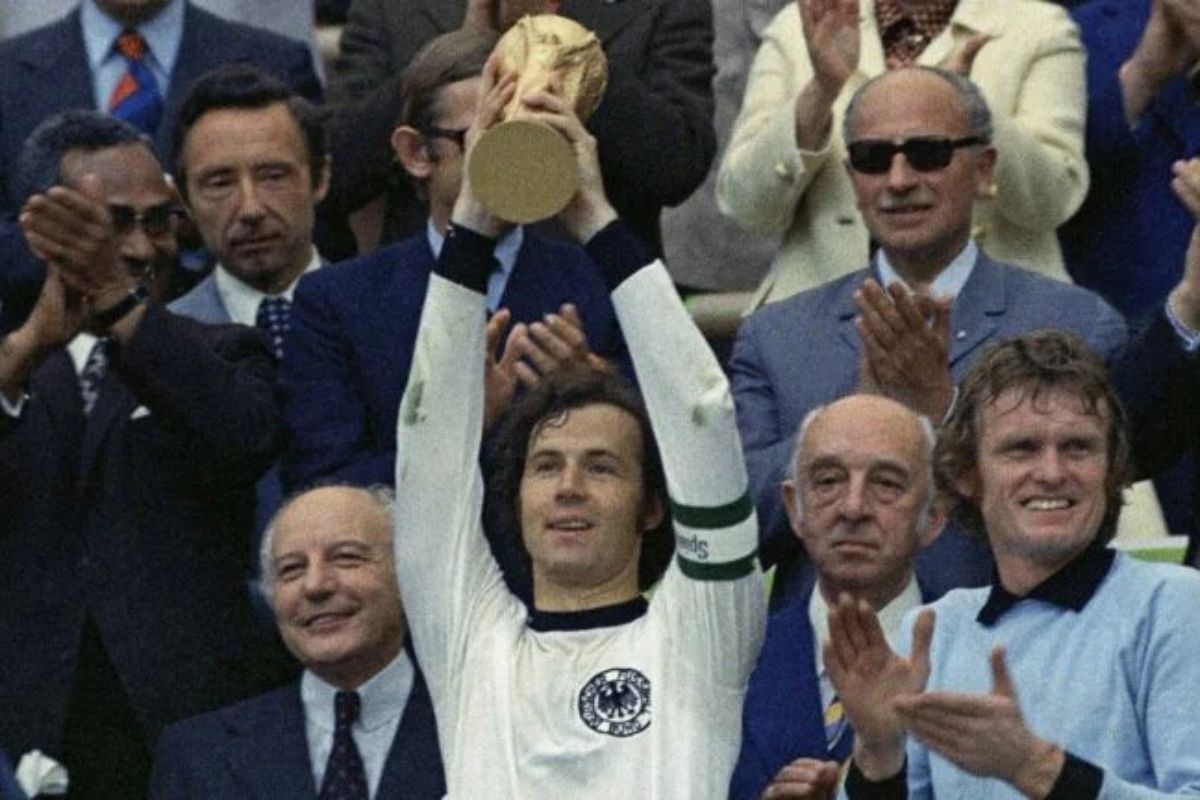
| Years |
Team |
Apps |
Goals |
| 1964–1977 |
Bayern Munich |
427 |
60 |
| 1977–1980 |
New York Cosmos |
80 |
17 |
| 1980–1982 |
Hamburger SV |
28 |
0 |
| 1983 |
New York Cosmos |
25 |
2 |
Franz Beckenbauer, known as “Der Kaiser,” is one of football’s greatest defenders and a pioneering figure in the evolution of the game. Born in 1945 in Munich, Germany, Beckenbauer began his professional career with Bayern Munich, where he became synonymous with success. Renowned for his leadership, elegance on the ball, and tactical intelligence, Beckenbauer transformed the role of the sweeper, or libero, into a crucial attacking position in football.
Beckenbauer led Bayern Munich to 3 European Cups and 7 Bundesliga titles during his time at the club, cementing his legacy as one of the finest defenders to ever play. He was also instrumental in Germany’s success on the international stage, captaining the team to victory in the 1974 FIFA World Cup. As one of the few players to have won the World Cup both as a player and later as a coach, Beckenbauer’s influence extended beyond his playing career. He went on to manage Germany, leading them to a 1990 World Cup win.
Career Achievements:
- 3 European Cups with Bayern Munich (1974, 1975, 1976)
- 7 Bundesliga titles with Bayern Munich (1969, 1972–1974, 1980, 1981, 1985)
- 1974 FIFA World Cup winner with West Germany
- 2 Ballon d’Ors (1972, 1976)
- 1 FIFA World Cup as a manager (1990)
- 1 UEFA Cup Winners’ Cup with Bayern Munich (1967)
- 1 Intercontinental Cup with Bayern Munich (1976)
- 1 DFB-Pokal with Bayern Munich (1966)
8. Alfredo Di Stefano
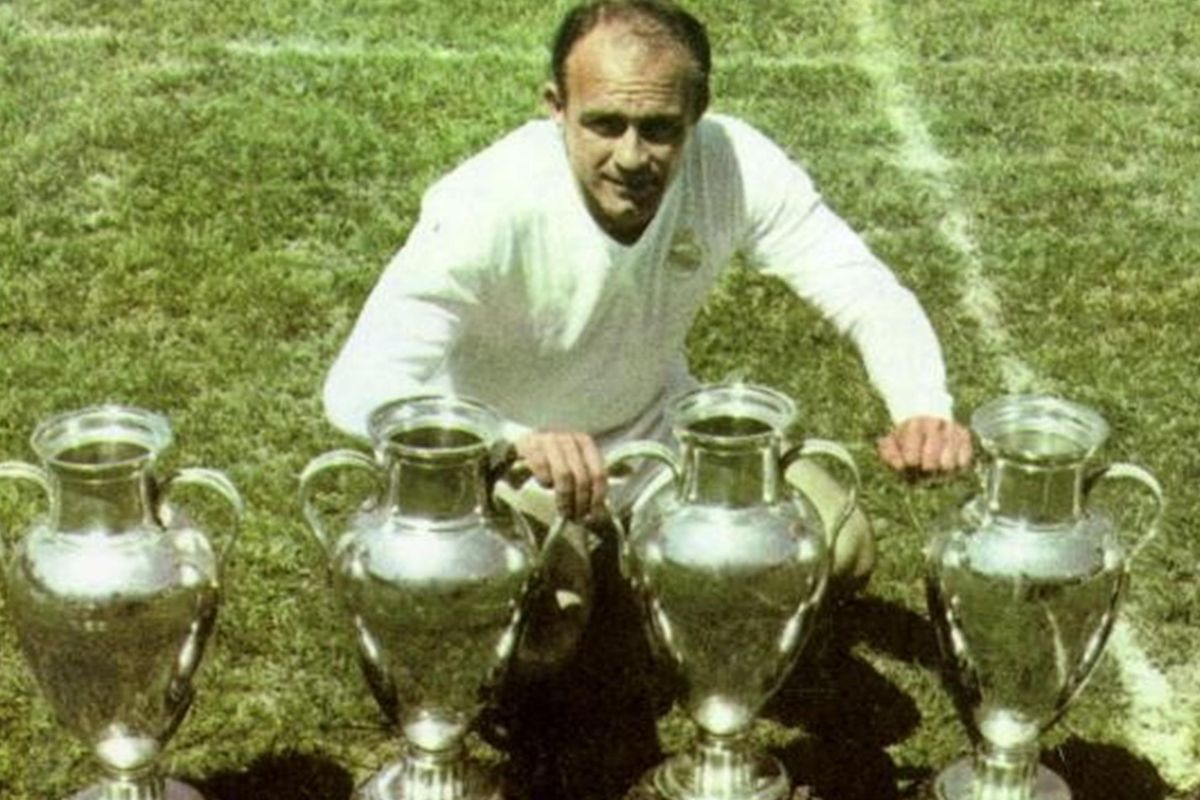
| Years |
Team |
Apps |
Goals |
| 1945–1949 |
River Plate |
66 |
49 |
| 1945–1946 |
→ Huracán (loan) |
25 |
10 |
| 1949–1953 |
Millonarios |
101 |
90 |
| 1953–1964 |
Real Madrid |
282 |
216 |
| 1964–1966 |
Espanyol |
47 |
11 |
Alfredo Di Stéfano is regarded as one of the greatest footballers to ever play the game, known for his incredible versatility and influence on the pitch. Born in 1926 in Buenos Aires, Argentina, he began his career with River Plate, before moving to Millonarios in Colombia, where he established himself as a rising star. In 1953, Di Stéfano joined Real Madrid, where his impact would be felt for over a decade, becoming the backbone of the club’s golden era.
Known for his all-around ability, Di Stéfano could play almost every position on the field with exceptional skill. His leadership and tireless work ethic helped Real Madrid win 5 consecutive European Cups from 1956 to 1960, and he played a pivotal role in each victory. His unique ability to both create and score goals made him a revolutionary figure in football.
Internationally, Di Stéfano represented Argentina, Colombia, and Spain, but never played in a World Cup, which many consider one of football’s great “what ifs.” He retired in 1966, leaving a legacy that continues to inspire players today. His name is synonymous with Real Madrid’s success, and his influence remains unmatched.
Career Achievements:
- 5 European Cups with Real Madrid (1956–1960)
- 8 La Liga titles with Real Madrid (1954–1964)
- 2 Ballon d’Ors (1957, 1959)
- Super Ballon d’Or (1989)
- Top scorer in La Liga (5 times)
- Real Madrid’s second-highest all-time scorer at the time of his retirement
7. Zinedine Zidane
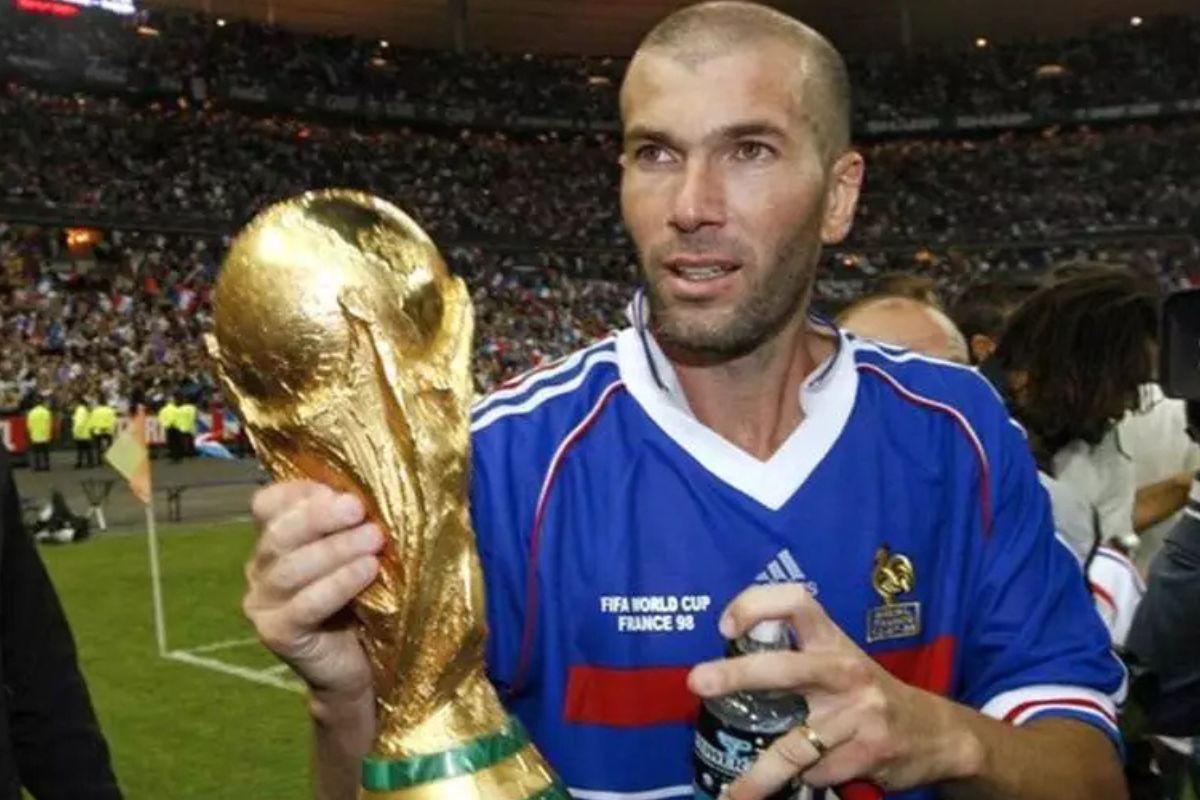
| Years |
Team |
Apps |
Goals |
| 1989–1992 |
Cannes |
61 |
6 |
| 1992–1996 |
Bordeaux |
139 |
28 |
| 1996–2001 |
Juventus |
151 |
24 |
| 2001–2006 |
Real Madrid |
155 |
37 |
In our list of Greatest Footballers of All Time, Zinedine Zidane, often called “Zizou,” is renowned for his elegance, vision, and composure on the ball, with brilliance and influence truly unmatched.
Born in 1972 in Marseille, France, he began his professional career with Cannes before moving to Bordeaux. His performances caught the attention of Juventus, where he won 2 Serie A titles and established himself as one of the best midfielders in the world.
In 2001, Zidane joined Real Madrid for a then-world record fee. He became a pivotal figure in the Galácticos era, helping the club win the Champions League in 2002 with a stunning volley in the final against Bayer Leverkusen.
Internationally, Zidane led France to their first-ever World Cup victory in 1998, scoring 2 goals in the final against Brazil. He also helped France win Euro 2000 and was awarded the Golden Ball in the 2006 World Cup, despite a controversial red card in the final. Zidane retired in 2006 and later achieved success as a manager, winning 3 consecutive Champions League titles with Real Madrid.
Career Achievements:
- 1998 FIFA World Cup Winner
- 2000 UEFA Euro Winner
- 2006 FIFA World Cup Golden Ball
- 1 Champions League title with Real Madrid (2002)
- 2 Serie A titles with Juventus (1997, 1998)
- 1 La Liga title with Real Madrid (2003)
- 1998 Ballon d’Or Winner
- 3-time FIFA World Player of the Year (1998, 2000, 2003)
6. Ronaldo Nazario

| Years |
Team |
Apps |
Goals |
| 1993–1994 |
Cruzeiro |
34 |
34 |
| 1994–1996 |
PSV |
46 |
42 |
| 1996–1997 |
Barcelona |
37 |
34 |
| 1997–2002 |
Inter Milan |
68 |
49 |
| 2002–2007 |
Real Madrid |
127 |
83 |
| 2007–2008 |
AC Milan |
20 |
9 |
| 2009–2011 |
Corinthians |
52 |
29 |
Ronaldo Nazário, also known as “The Phenomenon,” is celebrated for his explosive speed, skillful dribbling, and clinical finishing. Born in 1976 in Rio de Janeiro, Brazil, he began his career at Cruzeiro before moving to PSV Eindhoven in 1994, where he showcased his prodigious talent. In 1996, he joined Barcelona and had a sensational season, scoring 47 goals in 49 games. His performances earned him his first FIFA World Player of the Year award.
Ronaldo then moved to Inter Milan in 1997, where injuries hampered his progress, but he still delivered memorable performances, including a UEFA Cup triumph in 1998. He later joined Real Madrid in 2002, becoming a key figure in the Galácticos era, winning 2 La Liga titles. Despite multiple knee injuries, his resilience and talent shone through.
On the international stage, Ronaldo led Brazil to World Cup glory in 2002, scoring 8 goals and earning the Golden Boot. He is the second-highest World Cup scorer of all time with 15 goals. He retired in 2011 but remains a football icon.
Career Achievements:
- 2 FIFA World Cup titles (1994, 2002)
- 2 Ballon d’Ors (1997, 2002)
- 3 FIFA World Player of the Year awards (1996, 1997, 2002)
- 1998 World Cup Golden Ball
- 2002 World Cup Golden Boot
- 2 La Liga titles with Real Madrid (2003, 2007)
- 1 Copa del Rey with Barcelona (1997)
- UEFA Cup with Inter Milan (1998)
- Scored 15 World Cup goals
5. Johan Cruyff
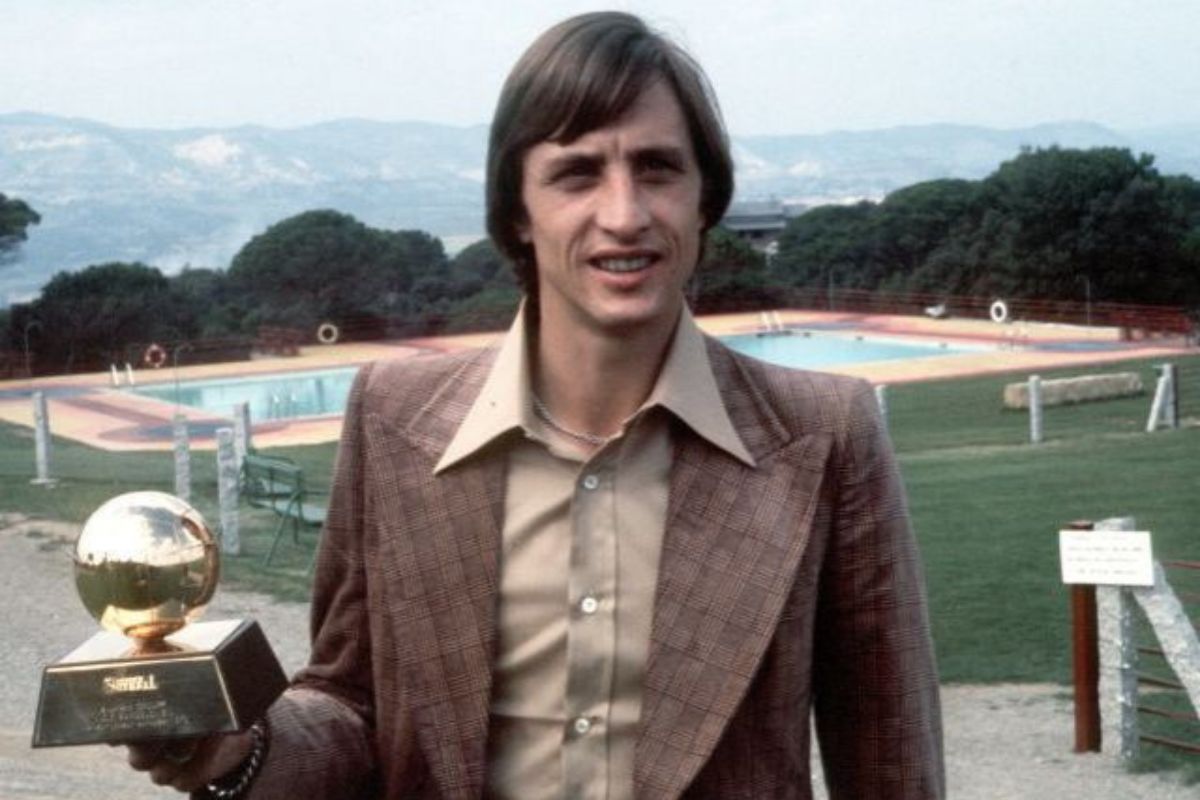
| Years |
Team |
Apps |
Goals |
| 1964–1973 |
Ajax |
245 |
193 |
| 1973–1978 |
Barcelona |
143 |
48 |
| 1979 |
Los Angeles Aztecs |
22 |
14 |
| 1980–1981 |
Washington Diplomats |
29 |
12 |
| 1981 |
→ Levante (loan) |
10 |
2 |
| 1981–1983 |
Ajax |
36 |
14 |
| 1983–1984 |
Feyenoord |
33 |
11 |
In our 5th rank of our list of Best Football Players of All Time, Johan Cruyff’s impact on football is immeasurable.
Johan Cruyff, one of football’s most influential figures, redefined the game with his intelligence, skill, and vision. Born in 1947 in Amsterdam, Cruyff began his professional career at Ajax in 1964. During his time there, he helped the club win 8 Eredivisie titles and 3 consecutive European Cups (1971, 1972, 1973). His innovative style of play was key to the development of “Total Football,” a tactical system that emphasized versatility and fluid movement.
In 1973, Cruyff joined Barcelona, where he won La Liga in his debut season and laid the foundation for the club’s future success. He later played in the United States for the Los Angeles Aztecs and the Washington Diplomats before returning to the Netherlands to play for Ajax and Feyenoord.
Cruyff also made his mark internationally, leading the Netherlands to the 1974 World Cup Final, where he won the Golden Ball as the tournament’s best player. Post-retirement, he continued his legacy as a visionary coach, especially at Barcelona. His philosophy shaped modern football.
Career Achievements:
- 3 Ballon d’Ors (1971, 1973, 1974)
- 3 European Cups with Ajax (1971, 1972, 1973)
- 8 Eredivisie titles
- 1 La Liga title with Barcelona (1974)
- 1974 World Cup Golden Ball Winner
- KNVB Cup with Ajax and Feyenoord
- Architect of “Total Football”
4. Cristiano Ronaldo
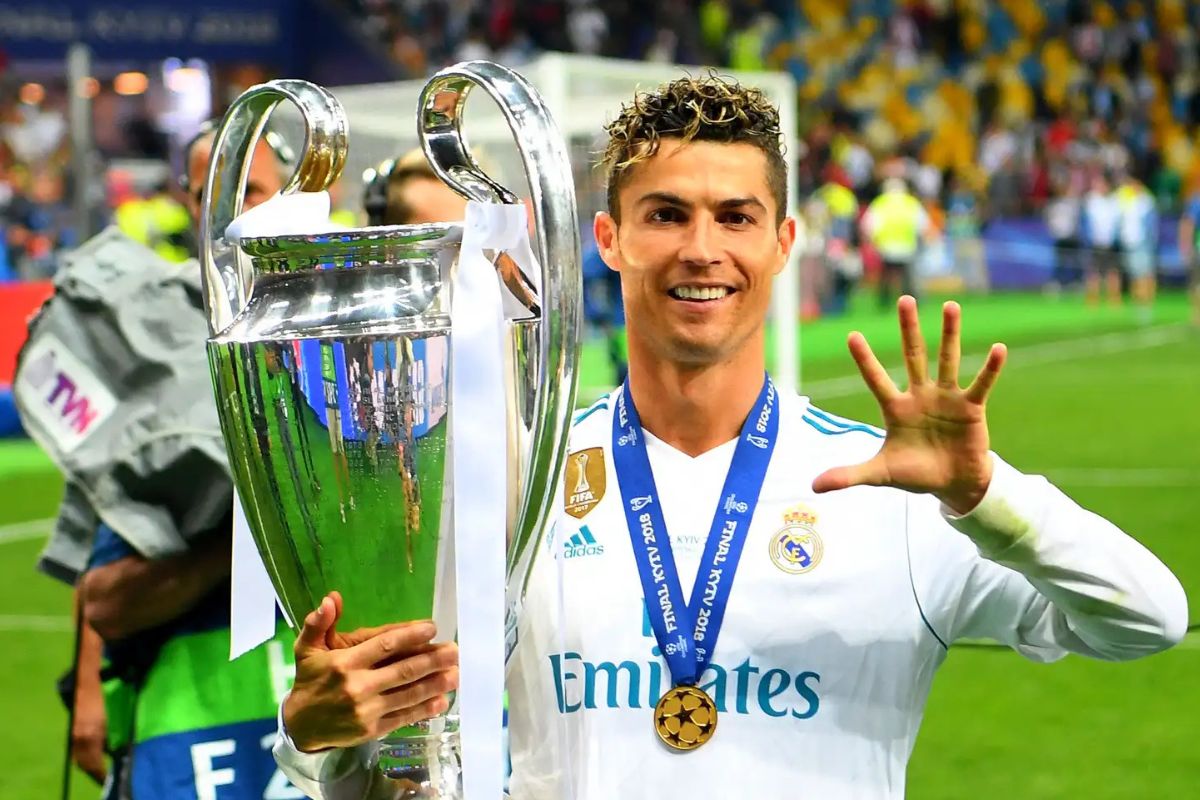
| Years |
Team |
Apps |
Goals |
| 2002–2003 |
Sporting CP B |
2 |
0 |
| 2002–2003 |
Sporting CP |
25 |
3 |
| 2003–2009 |
Manchester United |
196 |
84 |
| 2009–2018 |
Real Madrid |
292 |
311 |
| 2018–2021 |
Juventus |
98 |
81 |
| 2021–2022 |
Manchester United |
40 |
19 |
| 2023– |
Al Nassr |
57 |
56 |
Cristiano Ronaldo is a testament to dedication, athleticism, and goal-scoring excellence. Born in 1985 in Madeira, Portugal, he began his professional career at Sporting CP before making his mark with Manchester United in 2003. Under Sir Alex Ferguson, he won 3 Premier League titles and a Champions League title in 2008, establishing himself as one of the best players in the world.
In 2009, Ronaldo joined Real Madrid for a then-world record fee. During his 9-year stint, he became the club’s all-time top scorer with 450 goals, winning 4 Champions League titles and 2 La Liga titles. His rivalry with Lionel Messi defined a footballing era. A move to Juventus in 2018 saw him claim 2 Serie A titles, further showcasing his adaptability.
Internationally, Ronaldo led Portugal to their first major trophies: the 2016 UEFA Euro and the 2019 Nations League. Now at Al Nassr, he continues to break records. With over 850 career goals, Ronaldo’s blend of speed, power, and precision remains unparalleled.
Career Achievements:
- 5 Ballon d’Ors (2008, 2013, 2014, 2016, 2017)
- 5 Champions League titles
- 3 Premier League titles
- 2 La Liga titles
- 2 Serie A titles
- 2016 UEFA Euro Winner
- 2019 Nations League Winner
- 850+ career goals
- All-time top scorer in international football
3. Diego Maradona
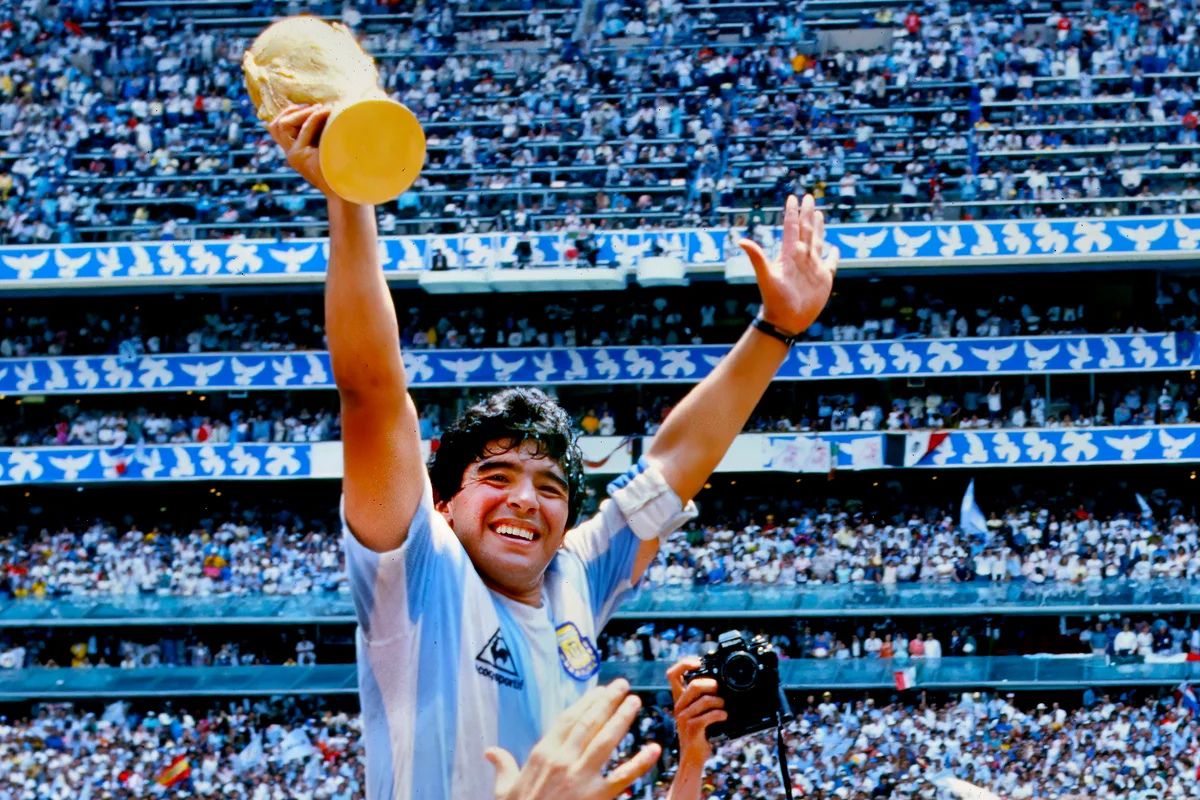
| Years |
Team |
Apps |
Goals |
| 1976–1981 |
Argentinos Juniors |
166 |
116 |
| 1981–1982 |
Boca Juniors |
40 |
28 |
| 1982–1984 |
Barcelona |
36 |
22 |
| 1984–1991 |
Napoli |
188 |
81 |
| 1992–1993 |
Sevilla |
26 |
5 |
| 1993–1994 |
Newell’s Old Boys |
5 |
0 |
| 1995–1997 |
Boca Juniors |
30 |
7 |
Diego Maradona, often hailed as one of football’s most gifted players, was a symbol of skill, passion, and charisma. Born in 1960 in Buenos Aires, Argentina, Maradona began his professional career with Argentinos Juniors at 15. He quickly rose to stardom, showcasing extraordinary dribbling, vision, and creativity. After a brief stint at Boca Juniors, he moved to Barcelona in 1982, where injuries and challenges limited his success.
Maradona’s most iconic period came at Napoli (1984–1991), where he led the club to their first-ever Serie A titles in 1987 and 1990, forever cementing his legendary status in Italy. His greatest triumph, however, was leading Argentina to the 1986 FIFA World Cup title, with his legendary “Hand of God” goal and the stunning “Goal of the Century” against England defining his genius.
Despite personal struggles, Maradona’s brilliance on the pitch remains unmatched. He finished his career with Boca Juniors in 1997. His legacy endures as a player who combined flair, grit, and an unyielding love for the game.
Career Achievements:
- 1986 FIFA World Cup Winner
- 2 Serie A titles with Napoli (1987, 1990)
- UEFA Cup with Napoli (1989)
- 1 Copa del Rey with Barcelona (1983)
- Golden Ball for Best Player of the 1986 World Cup
- Argentine Primera División title with Boca Juniors (1981)
- Scored the “Goal of the Century” in 1986
2. Pele
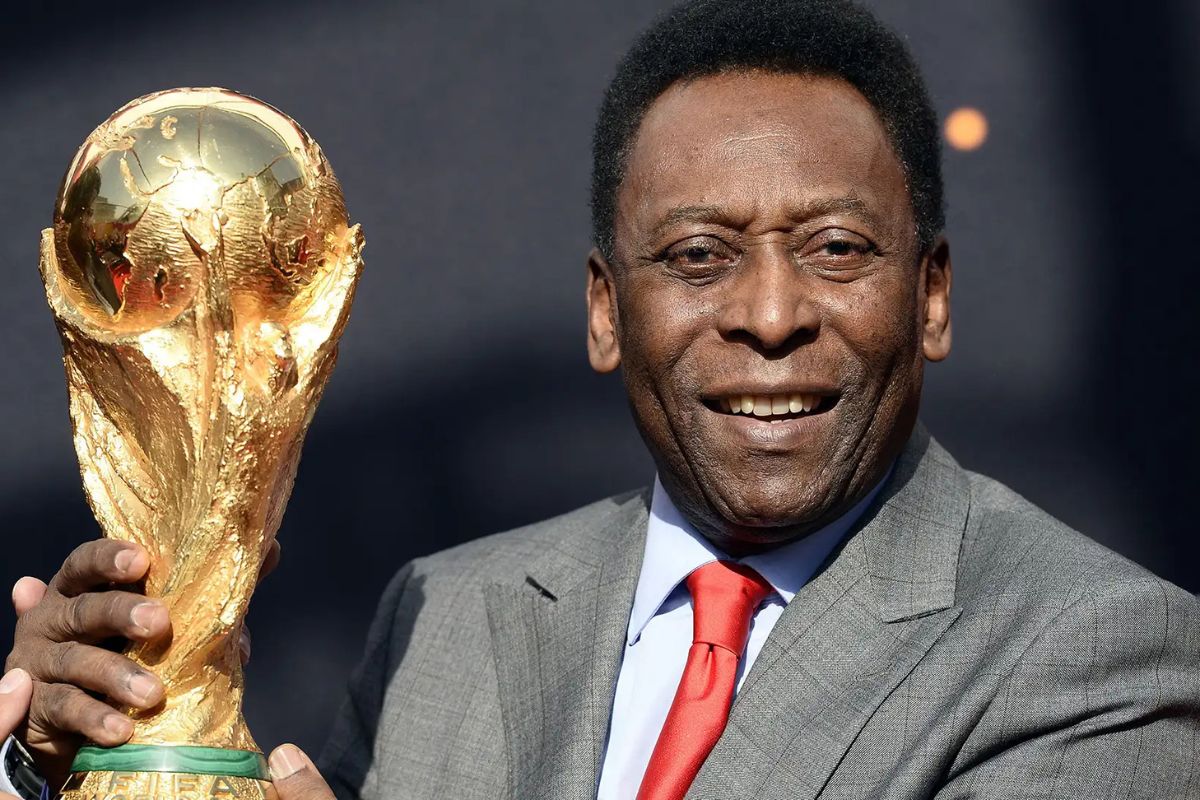
| Years |
Team |
Apps |
Goals |
| 1956–1974 |
Santos |
583 |
569 |
| 1975–1977 |
New York Cosmos |
64 |
37 |
Pelé, widely regarded as one of the greatest footballers of all time, had a career marked by extraordinary talent, consistency, and success. Born in 1940 in Brazil, he began his professional journey with Santos FC at just 15. Over an illustrious 18-year spell with the club, Pelé scored over 1,000 goals and won multiple trophies, including 6 Brazilian league titles and 2 Copa Libertadores titles.
Pelé’s international career with Brazil was even more legendary. He won an unprecedented 3 FIFA World Cups (1958, 1962, and 1970), becoming the youngest-ever World Cup winner in 1958 at just 17 years old. His performances combined incredible dribbling, clinical finishing, and remarkable vision. In his later years, Pelé played for the New York Cosmos, helping popularize football in the United States.
Known for his sportsmanship and charisma, Pelé retired in 1977 but remains an enduring icon of the game. His influence on football transcended generations, and his scoring record of 1,283 goals in 1,363 matches is legendary.
Career Achievements:
- 3 FIFA World Cup titles (1958, 1962, 1970)
- 2 Copa Libertadores titles (1962, 1963)
- 6 Brazilian league titles
- 1,283 career goals in 1,363 matches
- Youngest World Cup winner (1958, at 17)
- FIFA Player of the Century (2000)
- NY Cosmos Soccer Bowl title (1977)
1. Lionel Messi
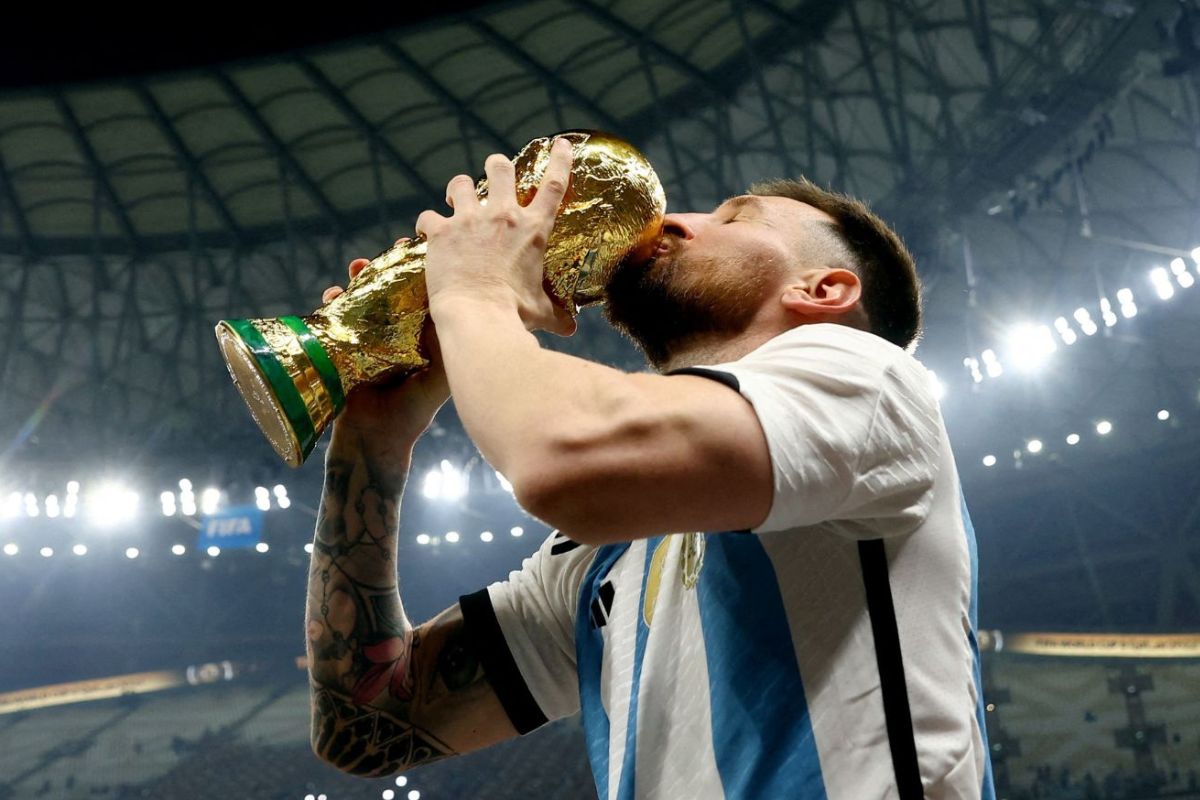
| Years |
Team |
Apps |
Goals |
| 2003–2004 |
Barcelona C |
10 |
5 |
| 2004–2005 |
Barcelona B |
22 |
6 |
| 2004–2021 |
Barcelona |
520 |
474 |
| 2021–2023 |
Paris Saint-Germain |
58 |
22 |
| 2023– |
Inter Miami |
25 |
21 |
In our 1st rank of our list of Best Football Players of All Time, Messi has cemented his legacy as the greatest player ever. Lionel Messi’s career is a tale of relentless brilliance, adaptability, and unparalleled success. Emerging from Barcelona’s famed La Masia academy, Messi made his first-team debut in 2004 and never looked back. Over 17 years at Barcelona, he won 10 La Liga titles, 4 Champions Leagues, and 7 Copa del Rey trophies. Individually, Messi has claimed a record 8 Ballon d’Ors, reflecting his dominance over two decades.
Also Read:











